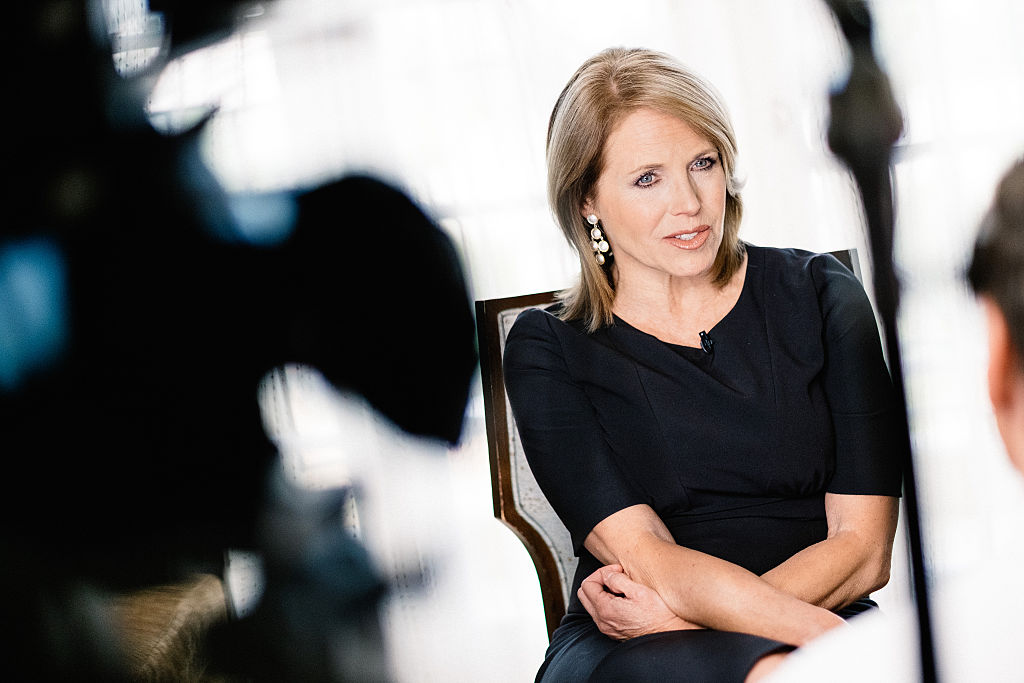What Katie Couric's deceptive editing can teach us about media bias
Don't believe everything you read, see, or hear...


Katie Couric has finally apologized for her misleading editing of a documentary on gun violence. But that shouldn't be the end of this sordid story.
Couric's documentary, Under the Gun, shows her interviewing members of a gun rights organization, the Virginia Citizens Defense League. She asks activists from the group, "If there are no background checks for gun purchasers, how do you prevent felons or terrorists from purchasing a gun?"
The documentary then shows the silent faces of the activists, giving the impression that they were stumped by the question, for nine awkward seconds. It's powerful.
The Week
Escape your echo chamber. Get the facts behind the news, plus analysis from multiple perspectives.

Sign up for The Week's Free Newsletters
From our morning news briefing to a weekly Good News Newsletter, get the best of The Week delivered directly to your inbox.
From our morning news briefing to a weekly Good News Newsletter, get the best of The Week delivered directly to your inbox.
Oh, except for one problem: In reality, as audio uncovered by the Washington Free Beacon shows, the activists did give a range of answers, including sophisticated ones.
Jon Stewart turned this sort of deceptive editing into a classic form of comedy. After a question, he would splice in unrelated footage of the interviewee staring to make him or her look stumped, or stupid, or awkward, to great comedic effect. But Stewart was a comedian and never claimed to be a Serious Journalist. Katie Couric is supposed to be a Serious Journalist.
Editing is a craft. No professional video editor who decided to add the footage of stumped gun-rights activists in this particular spot could fail to know what the result would be. Couric's initial excuse that the "pause" was intended as a "dramatic effect" to "give the audience a moment to consider the question." That is simply not credible.
And yet, this is just an uncommonly egregious example of the very-common progressive bias of many figures in the supposedly mainstream media. While they usually don't resort to being actively deceptive, journalists, intentionally or not, frequently frame subjects in a way that advances a progressive narrative.
A free daily email with the biggest news stories of the day – and the best features from TheWeek.com
But what rankles me most about this case is the hypocrisy.
Remember how last July a group called the Center for Medical Progress started publishing videos exposing Planned Parenthood's practice of trafficking body parts obtained from aborted fetuses? And how Planned Parenthood issued talking points calling the videos "deceptively edited"?
I point this out because Couric, who has marched in support of abortion rights, conducted softball interviews with Planned Parenthood President Cecile Richards, in which she called the videos "edited." (A dubious claim, at best.) As The Federalist's Mollie Hemingway points out, Couric's write-up of the Richards interview stated that the videos "were edited together in a way to depict Planned Parenthood employees talking about selling fetal tissue, which is illegal." Apparently, a far worse sort of "editing" is a-okay for Couric herself.
But it's not just about Couric. Matt Continetti, the editor of the Washington Free Beacon, which got the scoop about Couric, had a bit of deserved fun at the expense of The New York Times, which covered the Couric controversy under this headline: "Audio of Katie Couric Interview Shows Editing Slant in Gun Documentary, Site Claims." "Site Claims"!
No claims by a site are necessary. The audio shows that the gun video was deceptively edited. Full stop.
It's almost as if the mainstream media is trying to confirm the conservative caricature of the elite liberal media as a dishonest, self-dealing clique out to impose their own worldview and protect their own interests...
Pascal-Emmanuel Gobry is a writer and fellow at the Ethics and Public Policy Center. His writing has appeared at Forbes, The Atlantic, First Things, Commentary Magazine, The Daily Beast, The Federalist, Quartz, and other places. He lives in Paris with his beloved wife and daughter.
-
 The week’s best photos
The week’s best photosIn Pictures A Viking festival, an inky fingerprint, and more
-
 6 homes with incredible balconies
6 homes with incredible balconiesFeature Featuring a graceful terrace above the trees in Utah and a posh wraparound in New York City
-
 Did Alex Pretti’s killing open a GOP rift on guns?
Did Alex Pretti’s killing open a GOP rift on guns?Talking Points Second Amendment groups push back on the White House narrative
-
 The billionaires’ wealth tax: a catastrophe for California?
The billionaires’ wealth tax: a catastrophe for California?Talking Point Peter Thiel and Larry Page preparing to change state residency
-
 Bari Weiss’ ‘60 Minutes’ scandal is about more than one report
Bari Weiss’ ‘60 Minutes’ scandal is about more than one reportIN THE SPOTLIGHT By blocking an approved segment on a controversial prison holding US deportees in El Salvador, the editor-in-chief of CBS News has become the main story
-
 Has Zohran Mamdani shown the Democrats how to win again?
Has Zohran Mamdani shown the Democrats how to win again?Today’s Big Question New York City mayoral election touted as victory for left-wing populists but moderate centrist wins elsewhere present more complex path for Democratic Party
-
 Millions turn out for anti-Trump ‘No Kings’ rallies
Millions turn out for anti-Trump ‘No Kings’ ralliesSpeed Read An estimated 7 million people participated, 2 million more than at the first ‘No Kings’ protest in June
-
 Ghislaine Maxwell: angling for a Trump pardon
Ghislaine Maxwell: angling for a Trump pardonTalking Point Convicted sex trafficker's testimony could shed new light on president's links to Jeffrey Epstein
-
 The last words and final moments of 40 presidents
The last words and final moments of 40 presidentsThe Explainer Some are eloquent quotes worthy of the holders of the highest office in the nation, and others... aren't
-
 The JFK files: the truth at last?
The JFK files: the truth at last?In The Spotlight More than 64,000 previously classified documents relating the 1963 assassination of John F. Kennedy have been released by the Trump administration
-
 'Seriously, not literally': how should the world take Donald Trump?
'Seriously, not literally': how should the world take Donald Trump?Today's big question White House rhetoric and reality look likely to become increasingly blurred
